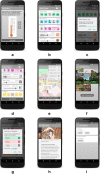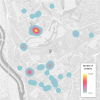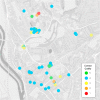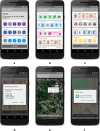Contact Logger: Measuring everyday intergroup contact experiences in near-time
- PMID: 31965475
- PMCID: PMC7406530
- DOI: 10.3758/s13428-019-01335-w
Contact Logger: Measuring everyday intergroup contact experiences in near-time
Abstract
Intergroup contact research has traditionally relied on retrospective accounts of intergroup encounters, mainly through survey-based or observational methods. This study introduces and tests the usability of a purpose-built, location-aware mobile application-the Contact Logger. This application enables the recording of interpersonal and intergroup encounters, in public and private spaces (both indoor and outdoor), in their here-and-now contexts. The main advantage of this approach, as compared to traditional methods, lies in its ability to collect repeated and timely (near-time) self-assessments of individuals' behaviors and experiences. It also allows for geographical location data to be logged. Usability testing was conducted in a real-world environment and took place over the course of seven days, during which participants (N = 12) logged every contact they had with an outgroup member (here, older people). Subsequently, participants completed a paper-and-pencil questionnaire, reporting on the usability and experience of using the Contact Logger. The results showed that the application is a viable and easy-to-use alternative to traditional methods. The information gathered aided the further development and optimization of the application. The outcomes of this development process are also briefly discussed.
Keywords: Ecological momentary assessment; Everyday contact; Experience sampling; Intergenerational contact; Intergroup contact; Mobile smartphone technology; Near-time data collection; Usability.
Figures






Similar articles
-
Feasibility and usability of experience sampling methodology for capturing everyday experiences of individuals with autism spectrum disorders.Disabil Health J. 2014 Jul;7(3):361-6. doi: 10.1016/j.dhjo.2014.04.004. Epub 2014 May 5. Disabil Health J. 2014. PMID: 24947579
-
Smartphone-based ecological momentary assessment reveals mental health benefits of birdlife.Sci Rep. 2022 Oct 27;12(1):17589. doi: 10.1038/s41598-022-20207-6. Sci Rep. 2022. PMID: 36302928 Free PMC article.
-
Developing a smartphone-based ecological momentary assessment protocol to collect biopsychosocial data with community-dwelling late-middle-aged and older adults.Transl Behav Med. 2019 Jul 16;9(4):711-719. doi: 10.1093/tbm/iby096. Transl Behav Med. 2019. PMID: 30395340
-
A meta-analytic test of intergroup contact theory.J Pers Soc Psychol. 2006 May;90(5):751-83. doi: 10.1037/0022-3514.90.5.751. J Pers Soc Psychol. 2006. PMID: 16737372 Review.
-
Possible Application of Ecological Momentary Assessment to Older Adults' Daily Depressive Mood: Integrative Literature Review.JMIR Ment Health. 2020 Jun 2;7(6):e13247. doi: 10.2196/13247. JMIR Ment Health. 2020. PMID: 32484442 Free PMC article. Review.
Cited by
-
Open-source smartphone app and tools for measuring, quantifying, and visualizing technology use.Behav Res Methods. 2022 Feb;54(1):1-12. doi: 10.3758/s13428-021-01585-7. Epub 2021 Jun 3. Behav Res Methods. 2022. PMID: 34085234 Free PMC article.
-
A golden age of behavioural social psychology? Towards a social psychology of power and intergroup relations in the digital age.Br J Soc Psychol. 2025 Jul;64(3):e12896. doi: 10.1111/bjso.12896. Br J Soc Psychol. 2025. PMID: 40301125 Free PMC article.
-
Assessing computational reproducibility in Behavior Research Methods.Behav Res Methods. 2024 Dec;56(8):8745-8760. doi: 10.3758/s13428-024-02501-5. Epub 2024 Sep 25. Behav Res Methods. 2024. PMID: 39322919 Free PMC article.
-
Need Fulfillment During Intergroup Contact: Three Experience Sampling Studies.Pers Soc Psychol Bull. 2025 Jun;51(6):1047-1077. doi: 10.1177/01461672231204063. Epub 2023 Nov 21. Pers Soc Psychol Bull. 2025. PMID: 38124321 Free PMC article.
References
-
- Barlow, F. K., Paolini, S., Pedersen, A., Hornsey, M. J., Radke, H. R. M., Harwood, J., … Sibley, C. G. (2012). The contact caveat: Negative contact predicts increased prejudice more than positive contact predicts reduced prejudice. Personality and Social Psychology Bulletin, 38, 1629–1643. 10.1177/0146167212457953 - PubMed
-
- Benavides J, Demianyk B, McLeod RD, Friesen MR, Laskowski M, Ferens K, Mukhi SN. Proceedings of the 2011 IEEE First International Conference on Healthcare Informatics, Imaging and Systems Biology. Piscataway, NJ, USA: IEEE Press; 2011. 3G smartphone technologies for generating personal social network contact distributions and graphs; pp. 182–189.
-
- Bloomfield, J. (2013). The effectiveness of intercultural centres in creating convivial, diverse public spaces and enhancing community safety (Research Report for the Council of Europe & the European Commission). Retrieved from https://rm.coe.int/16803009cb
Publication types
MeSH terms
Grants and funding
LinkOut - more resources
Full Text Sources
Medical

